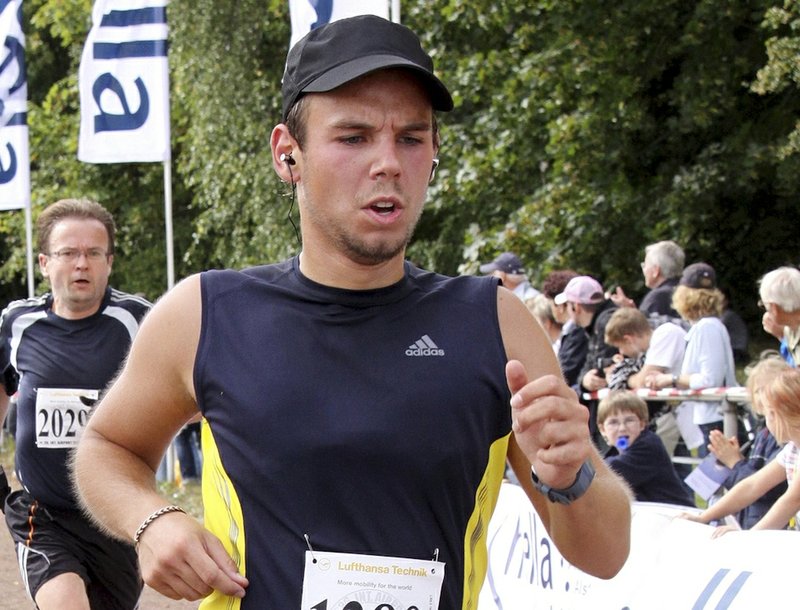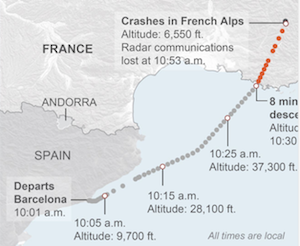PARIS -- Andreas Lubitz, the co-pilot suspected of deliberately flying a German airliner into the French Alps, appears to have rehearsed the plane's fatal dive during an earlier flight on the day of the crash, the French authorities said in a preliminary report published Wednesday.
The initial findings by the Bureau of Investigations and Analyses show that the co-pilot repeatedly set the Germanwings plane's altitude to 100 feet during its outbound flight to Barcelona, Spain, from Duesseldorf, Germany, on March 24.
The maneuvers, which were captured by the plane's flight data recorder, took place while the flight's captain had left the cockpit temporarily.
"To us, it is clear that this was some kind of rehearsal," said Remi Jouty, the bureau's director. "We see the same actions being taken in the same circumstances, at a moment when the co-pilot was alone in the cockpit."
The new information contained in the 29-page report provides further evidence suggesting the 27-year-old co-pilot crashed the Airbus A320 intentionally after locking the captain out of the cockpit, killing himself and 149 others, on its return leg to Duesseldorf.
An initial analysis of a cockpit audio recording retrieved from one of the plane's so-called black boxes just days after the crash led a French prosecutor to declare that Lubitz had acted deliberately.
Investigations by the German police later revealed that Lubitz had a history of severe depression dating to at least 2009, and that he had scoured the Internet for methods of committing suicide in the days before his final flight.
The French report indicates that Lubitz's trial run was so fleeting that it went undetected by air traffic controllers, who had already given instructions for a moderate descent to 35,000 feet from 37,000 feet. The flight's captain, Patrick Sondenheimer, also apparently did not notice the maneuvers, which occurred about 20 minutes into the flight and while the captain was out of the cockpit for roughly five minutes.
The report says that the co-pilot selected a target altitude of 100 feet "several times" for durations ranging from a few seconds to up to three minutes during the captain's absence.
French investigators did not try to explain Lubitz's actions, but they were unambiguous about his role in the crash.
"We cannot presume what was going on in his mind," Jouty said. "But based on all the information that we have gathered so far, we can affirm, categorically, that this crash was the result of an intentional act," he continued, "a series of steps that, taken together, all point in the same direction."
The report notes similarities between Lubitz's control inputs on the two flights and, in its analysis of the downed flight, supports the French prosecutor's initial conclusions. The co-pilot "intentionally modified the autopilot instructions to order the airplane to descend until it collided with the terrain," according to the report.
"He did not open the cockpit door during the descent, despite requests for access made via the keypad, the cabin interphone and knocks on the door," it said.
In the wake of the crash, Germany established a task force of aviation, medical and government experts to study the circumstances that led to the fatal descent and how it might have been averted.
Last month, two working groups met to discuss possible changes to cockpit-door security systems and to review the standards for monitoring pilots' mental health. The group expects to publish its initial findings before the summer.
The European Commission in Brussels is also expected in the coming days to announce the formation of a high-level working group that also would propose new rules intended to prevent similar disasters.
Although Lubitz is the highest-profile example of pilot suicide, his was not an isolated case. Over the past two decades, several fatal airline crashes have been attributed to deliberate actions by the pilot.
The Bureau of Investigations and Analyses probe is limited solely to determining the facts of the case and to making recommendations to safety regulators with the intent to reduce the risk of a similar event. Unlike the separate criminal inquiry being conducted by French prosecutors, it will not seek to apportion legal responsibility for the crash.
A Section on 05/07/2015

